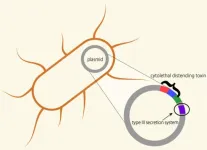(Press-News.org) Australia is taking proactive steps to enhance the resilience of its telecommunications sector, according to a world-first report from The Australian National University (ANU).
Several recent high-profile outages, contrasted with the near seamless shift to remote work during the pandemic, have shown how telecommunications resilience significantly impacts all Australians with stakes that are higher than ever before.
Telecommunications underpins our lives from global commerce and emergency services to healthcare and national security and energy and transportation.
Despite its national importance, it has been difficult to assess the resilience of the whole telecommunications sector due to different approaches by individual enterprises and levels of government, and a lack of a shared understanding of what resilience involves.
To fill this gap, Australia’s Department of Infrastructure, Transport, Regional Development, Communications and the Arts commissioned the ANU Tech Policy Design Centre (TPDC) to independently map the sector and better understand the risk landscape and whole-of-sector resilience.
The report, Australian Telecommunications Sector Resilience Profile, is a world-first, it:
combines risk and resilience
takes an all-hazards approach
adopts a sector-wide perspective; and
develops the Sector Resilience Maturity Model, a new analytical framework for assessing sector resilience at the national level.
TPDC assessed that the current maturity level of the Australian telecommunications sector is ‘developing’; level two on a five-point scale. This indicates that while basic resilience measures are in place, further action is needed to enhance coordination and resource allocation across the sector.
“Resilience is a hot topic but, as a methodology, it is comparatively new. It’s not surprising, therefore, that resilience in the Australian telecommunications sector is still developing,” Professor Johanna Weaver, Founding Director of the ANU TPDC, said.
“Our research shows that Australia is starting from a good foundation and, importantly, there is strong appetite from all stakeholders – in government, industry and civil society – to do better.
“I commend the government for commissioning this work. It’s only by understanding the current state that progress can be measured. This report is an invitation and a roadmap to enhance the resilience of the telecommunications sector on which all Australians depend every day.”
The report shows a shared vision for sector resilience. It provides a benchmark and essential evidence base for decision makers, industry, government, and the technical community.
The findings are a product of extensive consultations with more than 200 stakeholders from across the sector, representing all states, territories, and the federal government, plus representatives from industry, consumer groups and from dependent and interdependent sectors.
The report was refined, shaped, and endorsed by a 26-member Risk and Resilience Expert Panel consisting of diverse practitioners from the sector with backgrounds in engineering, network architecture, climate change research, government, enterprise, and strategic policy.
This report lays the groundwork for deepening collaborative efforts to enhance Australia’s ability to withstand and recover from inevitable disruptions. While the methodology was developed to profile the telecommunications sector, it is translatable to other critical sectors.
“The release of this report marks a significant step forward in enhancing the resilience of Australia's telecommunications sector. It highlights not just the challenges, but also the tremendous opportunities we have to build a more robust and reliable network for all Australians,” Professor Weaver said.
END
New report shows pathway to telecommunications resilience in Australia
2024-10-17
ELSE PRESS RELEASES FROM THIS DATE:
Initial prescriptions of sedatives among older stroke survivors may include too many pills
2024-10-17
Research Highlights:
Within 90 days after having an ischemic (clot-caused) stroke, about 5% of stroke survivors ages 65 and older were prescribed benzodiazepines (depressants that relieve anxiety, muscle spasms, produce sedation and reduce seizures) for the first time.
More than half of the new prescriptions of benzodiazepines were written for a supply of 15 to 30 days, rather than the smaller number of pills for short-term, as-needed use.
The study also found that women were more likely than men to receive an initial prescription ...
Buy your groceries online? Watch out for this food labeling gap
2024-10-17
Picture this: You’re shopping online for this week’s groceries. You try to pick healthy options based on the information provided by the online retailer. You can tell that the products you’re choosing are organic, non-GMO, or Fair Trade Certified. But in many cases, you can’t find the nutrition facts, ingredient list, or even a list of allergens.
A new, comprehensive study of online grocery retailers shows this problem is pervasive, to the detriment of public health and safety in the ...
Etcembly and University of Surrey launch pioneering study to unlock next-generation cancer treatments from survivors
2024-10-17
British techbio innovator Etcembly is teaming up with researchers and clinicians from the University of Surrey to launch a groundbreaking new study that could transform the future of cancer treatment. By analysing the immune cells of cancer survivors, this research is set to reveal untapped targets that could deliver the next generation of immunotherapies.
In recent years, treatments that harness a patient’s own immune system to fight cancer have become a key pillar of oncology. However, these drugs don’t work for all, and a wider range of novel immunotherapies is urgently needed.
T ...
City microbes surviving on disinfectants, research reveals
2024-10-17
After the recent pandemic, our use of disinfectants has increased, but are our efforts to create sterile urban environments backfiring?
A new study published in the journal Microbiome has identified novel strains of microbes that have adapted to use the limited resources available in cities and shown that our everyday behaviour is changing the makeup of microorganisms in indoor environments.
“Built environments offer distinct conditions that set them apart from natural and engineered habitats,” says Dr Xinzhao Tong, an assistant professor at Xi’an Jiaotong-Liverpool University (XJTLU), China, and lead author ...
Sleeping for 2: CBT for insomnia combats postpartum depression
2024-10-17
Cognitive behavioural therapy for insomnia (CBTI) delivered during pregnancy significantly reduces postpartum depressive symptoms in mothers, new research from UBC shows.
Researchers from the Vancouver and Okanagan campuses investigated whether treating insomnia during pregnancy could alleviate symptoms of postpartum depression, which affects many new mothers.
“Early intervention is crucial for infant and maternal mental health,” says Dr. Elizabeth Keys, an Assistant Professor in UBCO’s School of Nursing and study co-author. “Our research explores how addressing sleep problems, like insomnia, can lead to ...
Financial incentive encourages healthiness: why isn't it used more often?
2024-10-17
Move more, quit smoking, lose weight: great resolutions, hard to keep. But does it get easier if there is a financial incentive in return? According to research by Radboud University and others, it can be an effective tool, although there are still some obstacles. They presented their findings this week in Economisch Statistische Berichten (ESB).
Some lifestyle interventions are more effective than others, but in general, financial incentives are a ‘powerful tool to help reduce health inequalities in the Netherlands’, says Koen van der Swaluw of Radboud University. Despite knowing more and more about the effectiveness of financial incentives to promote ...
People sympathize with bullied AI bots
2024-10-17
In an Imperial College London study, humans displayed sympathy towards and protected AI bots who were excluded from playtime.
The researchers say the study, which used a virtual ball game, highlights humans' tendency to treat AI agents as social beings – an inclination that should be considered when designing AI bots.
The study is published in Human Behavior and Emerging Technologies.
Lead author Jianan Zhou, from Imperial’s Dyson School of Design Engineering, said: “This is a unique insight into how humans interact ...
Providencia rustigianii has virulence gene akin to Salmonella’s
2024-10-17
Salmonella and E. coli are well-known bacteria that cause food poisoning, but less understood are species of Providencia, another causative agent of serious symptoms. Providencia rustigianii, isolated from pediatric gastroenteritis patients, has now undergone whole genome sequencing by a research team led by Osaka Metropolitan University Professor Shinji Yamasaki of the Graduate School of Veterinary Science and the Osaka International Research Center for Infectious Diseases.
Members of the team had previously reported that P. rustigianii carries a cytolethal distending toxin virulence gene on its plasmid. Elimination of this gene did not ...
Ozempic (and similar medications) may be the new treatment for opioid and alcohol use disorder
2024-10-17
A new study published in the scientific journal Addiction has found that people with opioid or alcohol use disorder (OUD, AUD) who take Ozempic or similar medications to treat diabetic/weight-related conditions appear to have a 40% lower rate of opioid overdose and a 50% lower rate of alcohol intoxication than people with OUD and AUD who do not take Ozempic or similar medications.
Ozempic is one of several medications, called glucagon-like peptide-1 receptor agonists or GLP-1 RAs, that are prescribed to treat diabetes, obesity, and other weight-related medical conditions. The medications interact with ...
Artificial nests boost penguin breeding success, but there’s no one-size-fits-all design
2024-10-17
Artificial nests can boost the breeding success of endangered African penguins, but different designs are more effective at different colonies according to a new study by an international team of researchers from South Africa and the UK. The findings are published in the British Ecological Society journal, Ecological Solutions and Evidence.
A new study, led by researchers at Nelson Mandela University, which monitored the breeding success of African penguins for 12 years across South Africa has found that artificial ...



